Sir Alex Ferguson Biography
How great should someone be to be remembered as one of England’s greatest coaches of all time? When we say the “greatest football player”, we usually consider players who have performed marvelously, but one particular individual has done greater things out of the field than in it. We will meet this individual in Sir Alex Ferguson Biography.
One might argue that Sir Alex Ferguson was a player of his time, one of the greatest. However, his playing career usually is left unnoticed under the shadow of his exceptional achievements as a coach.
Sir Alex Ferguson was a skillful footballer, one of the best players of his era, and one of England’s most successful managers, having guided Manchester United to thirteen Premier League titles, two UEFA Champions Leagues, and five FA Cups. From 1986 to 2013, Sir Alex successfully coached Manchester United, one of England’s most important football clubs.
The Legendary Sir Alex Ferguson Biography
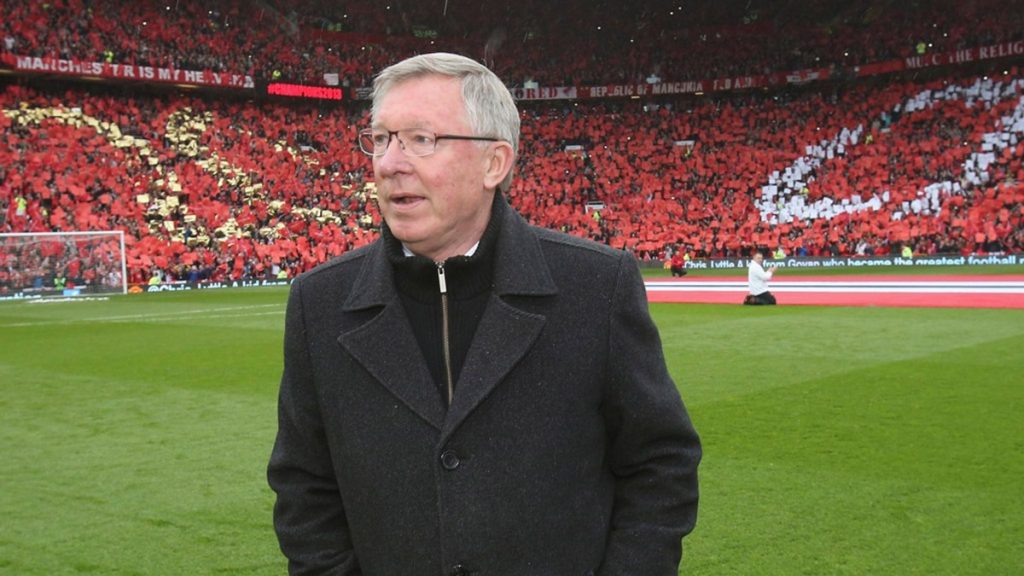
Many people have tried to write a full Alex Ferguson Biography article, but we promise that our version beats all of them. We have collected very rare moments of Sir Alex Ferguson, so we can provide you with a complete version of this story. Stay with us and enjoy as we present everything about Sir Alex Ferguson.
Sir Alex Ferguson’s introduction
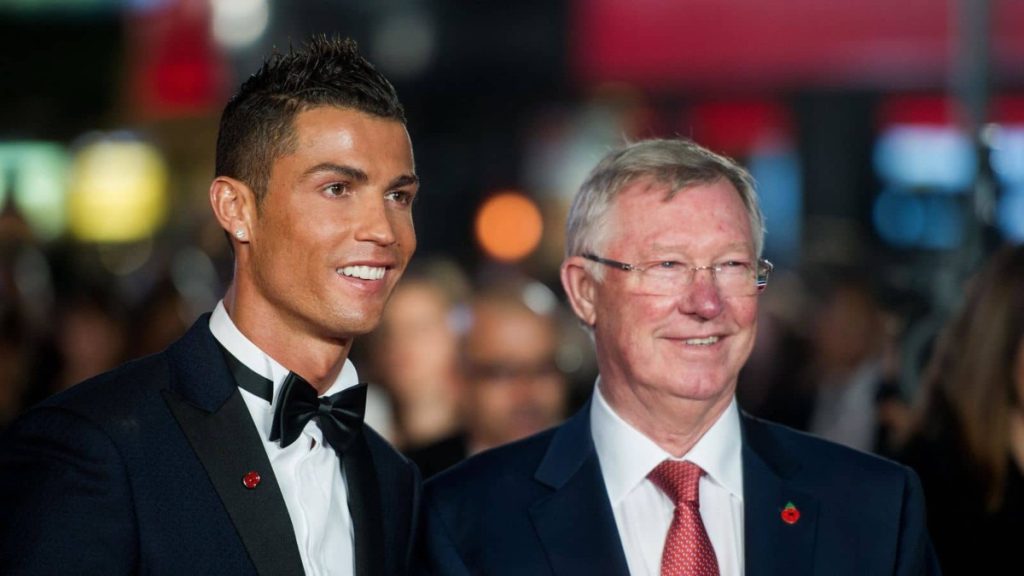
Here is some quick information about Sir Alex, so you will know him better before we start the article.
- Name: Alexander Chapman Ferguson
- Age: 81
- Nationality: Scottish/Scotland
- Last team managed: Manchester United
Now let’s get to Sir Alex Ferguson Biography biography.
Sir Alex Ferguson’s childhood
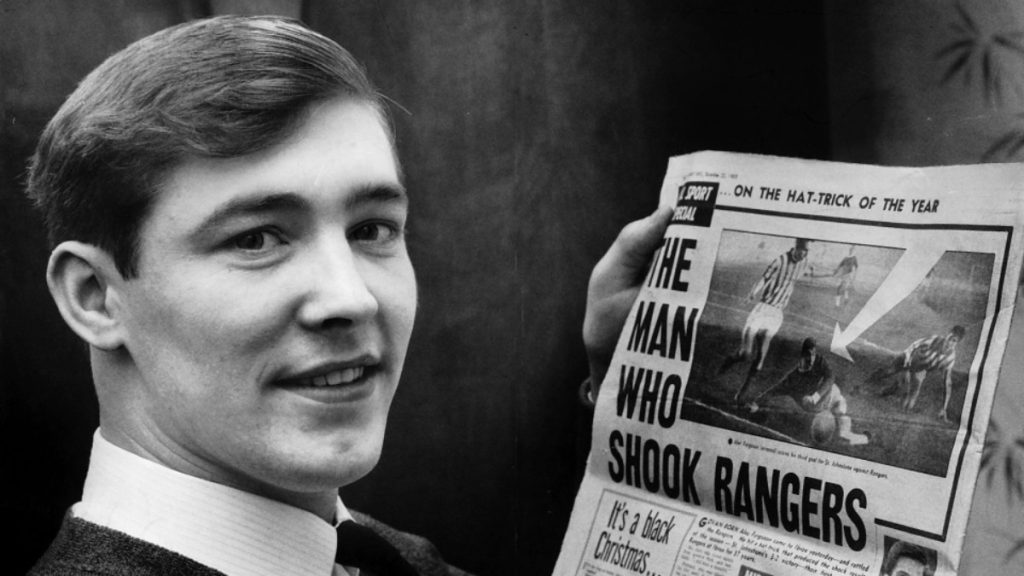
We know his achievements in recent years, but we presume that most of us are uninformed of his background and early years. So don’t worry—you will know this knowledge today after reading this section of Sir Alex Ferguson Biography.
Alexander Beaton Ferguson and Elizabeth Hardie Ferguson welcomed Sir Alex into the world on December 31st, 1941, in Glasgow, Scotland. Sir Alex Ferguson real name is Sir Alexander Chapman Ferguson.
Alex was born at Shieldhall Road in Govan, although he was raised in a flat at 667 Govan Road.
He grew up living with his parents and younger brother Martin. Govan, his town, is a working-class area of Glasgow, Scotland.
There was a good likelihood that everyone in the town, including Ferguson’s father, worked in the shipbuilding industry. He grew up in a neighborhood of shipbuilders.
Alex was a fan of the football team Rangers while attending Broomloan Road Primary School and, afterward, Govan High School.
Nonetheless, he stood out from other kids his age because of something unique about him. While he was a bright young man, he showed little interest in studying and preferred to play football.
He liked playing soccer in the alleyways between tenement houses with his younger brother Martin and pals, and with a little coaching from his father, he blossomed into a bright young player.
Entering football
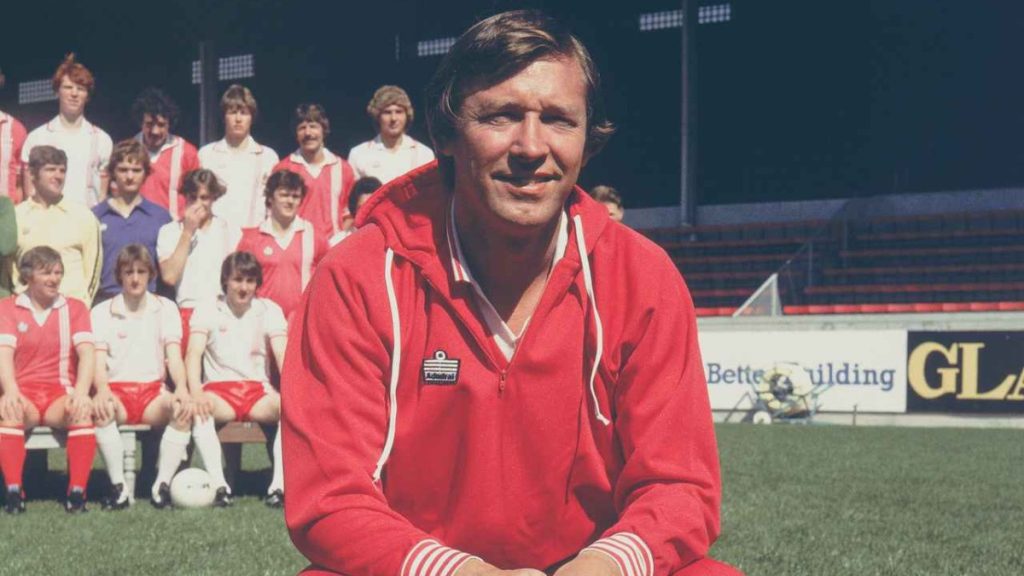
Sir Alex Ferguson was soon to step in his father’s footsteps and play on an amateur level before making it professional in football. Let’s read more in this section of Sir Alex Ferguson biography.
At the age of 16, Alex began playing football for Queens Park football club as an amateur. He called his debut a “nightmare,” but he did score Queen’s Park’s goal in a 2-1 loss to Stranraer.
Although having scored 20 goals in 31 appearances for Queen’s Park, he could not secure a spot in the starting lineup and left the club in 1960. After that, he played St Johnstone for four years but his run with the team wasn’t great.
Four years later, he joined Dunfermline Athletic. He won many games for the team’s Rangers and Dunfermline Athletic when he first started playing professionally, and he finished the 1965 league season as the league’s leading goal scorer with 45 goals in 51 games. With 31 goals, he shared the league lead in scoring with Joe McBride of Celtic in Scotland.
Ferguson then transferred to Rangers for a record-breaking £65,000, which was paid between the two Scottish clubs. He did well, but he wasn’t happy with the squad because of certain discrimination difficulties.
Yet the Scottish man’s fate had another plan for him.
At the age of 32, Alex concluded his playing career and assumed management of the East Stirlingshire team.
International career
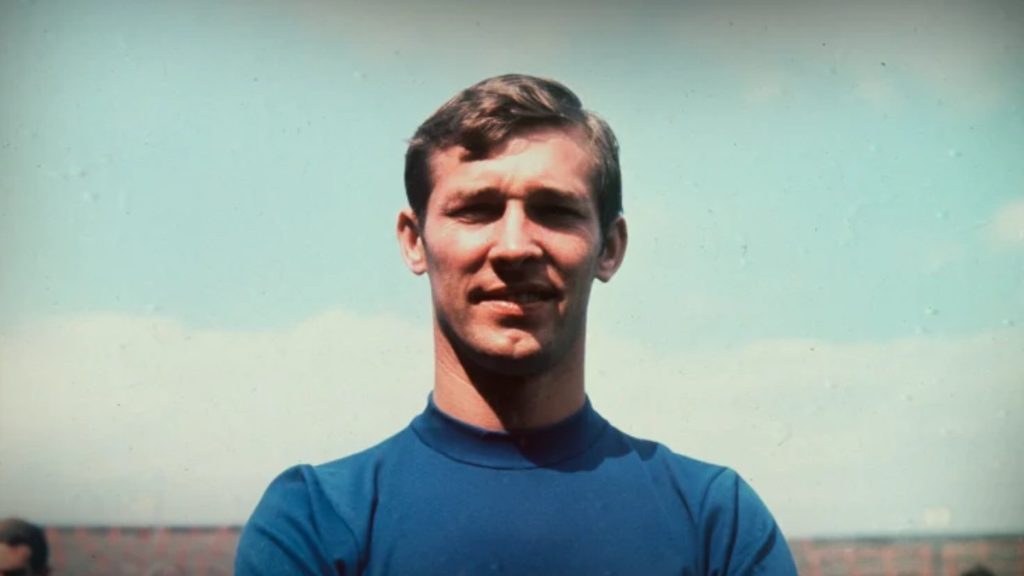
His international appearance was so brief that it’s not even worth talking about, but we have to since we want Sir Alex Ferguson biography to be complete.
Sir Alex Ferguson stats for his international team aren’t marvelous. He was only associated with the Scotland national team during a 1967 international tour. As the Scottish Football Association did not recognize any of the tour games as full internationals for many years, Ferguson was regarded as having never represented Scotland. He was included as one of the top Scottish players who had never participated in a complete international in a June 2020 BBC Sports piece. Ferguson received an international cap after the SFA declared in October 2021 that certain of the tour games would be classed as full internationals.
Managerial career
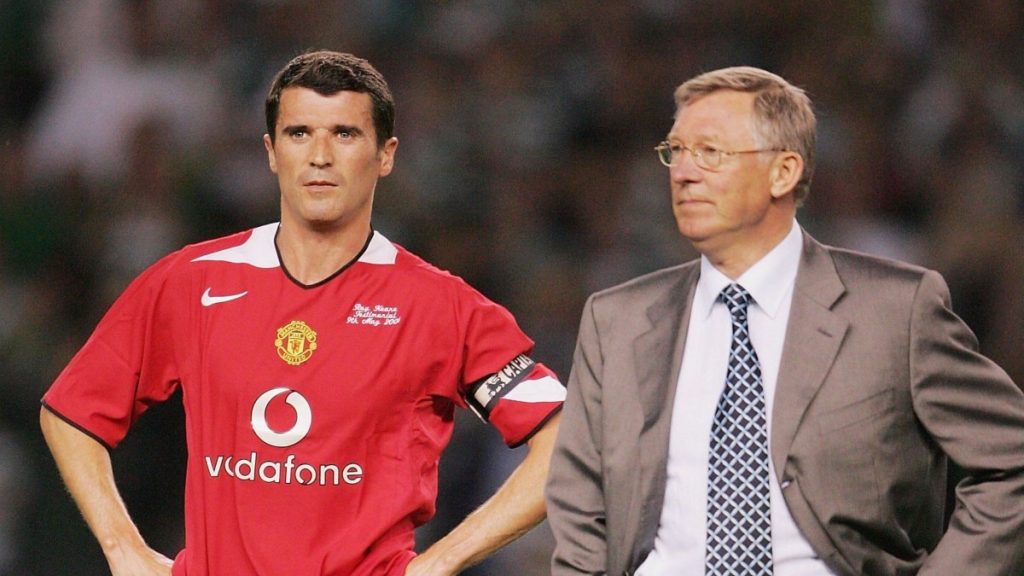
Even Sir Alex Ferguson had to retry a few times before starting a successful managerial run. So, don’t underestimate yourself and accompany us for the rest of Sir Alex Ferguson biography.
In 1974, the 32-year-old Ferguson started his management career at East Stirlingshire, where his fiery, competitive character had an immediate impact.
After a few months, he relocated to St. Mirren, and despite helping the Saints win the Scottish First Division title in 1977, he was sacked for contract violation a year later.
Ferguson established his name as a top-tier coach while at Aberdeen. Fergie led Aberdeen to three Scottish Premier League championships, four Scottish Cups, a League Cup, a Super Cup, and a European Cup Winners’ Cup during the course of eight seasons, breaking the Celtic-Rangers championship shackles.
In November 1986, Alex Ferguson was appointed manager of the legendary but then unsuccessful Manchester United team.
According to reports, his employment was in jeopardy during a particularly difficult period in the 1989–1990 season. His mother’s passing was the cause of his terrible start.
His prolonged mourning for his mother, who passed away from lung cancer, nearly lost him his career.
Thankfully for him, during his early tenure, The Red Devils made a comeback and won the FA Cup. He continued working as a result. Success after success followed, and the rest, so the tale goes, is history.
His management career had such a profound effect that it created a lasting influence in sports. On November 23rd, 2012, a bronze monument of Ferguson created by Scottish artist Philip Jackson was erected in front of Old Trafford.
Sir Alex Ferguson’s family
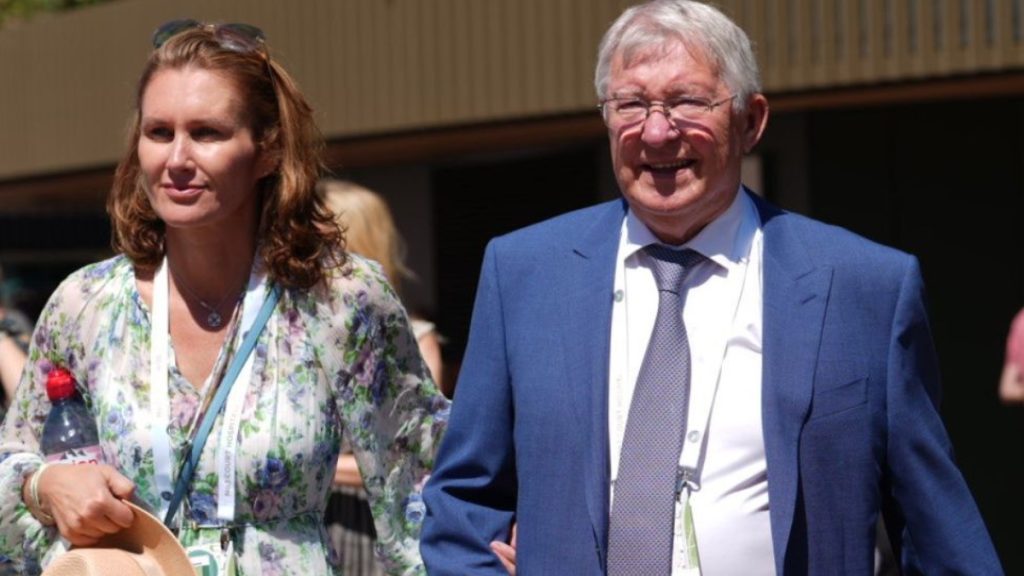
When it comes to Sir Alex Ferguson life story, and to his parents particularly, Sir Alex Ferguson biography takes a very sad turn.
Initially, Fergie came from a low-income household. He was from a poor but content family that resided in Glasgow’s Govan shipyard.
Prior to working in the shipbuilding industry, his father had never attained any significant heights. For survival, he chose amateur football, which paid him very little.
Yet, Alexander Beaton Ferguson didn’t give up playing amateur football until six years after Alex Ferguson’s birth, owing to a chance at the Glasgow shipbuilding company.
He changed to become a plater’s assistant. He was confident this time and could feed young Alex, his sibling, and his mother.
Sadly, Alex Ferguson and his parents passed away from the same illness—lung cancer—before they were 67, which was younger than the average British life expectancy. They were both heavy smokers, though.
In 1979, Alex Ferguson’s father passed away from lung cancer at the age of 66. Elizabeth Ferguson, Ferguson’s mother, passed away from lung cancer in 1986 at the age of 64. He had just been manager of Manchester United for three weeks when she passed away. The new manager was sober and in excruciating anguish for months after her unexpected demise. That was the reason for his Manchester United management career’s challenging beginning. It was one of the reasons he nearly lost his job. Losing both parents to the same illness caused a “devastating impact” and a protracted time of sorrow.
Wife and children
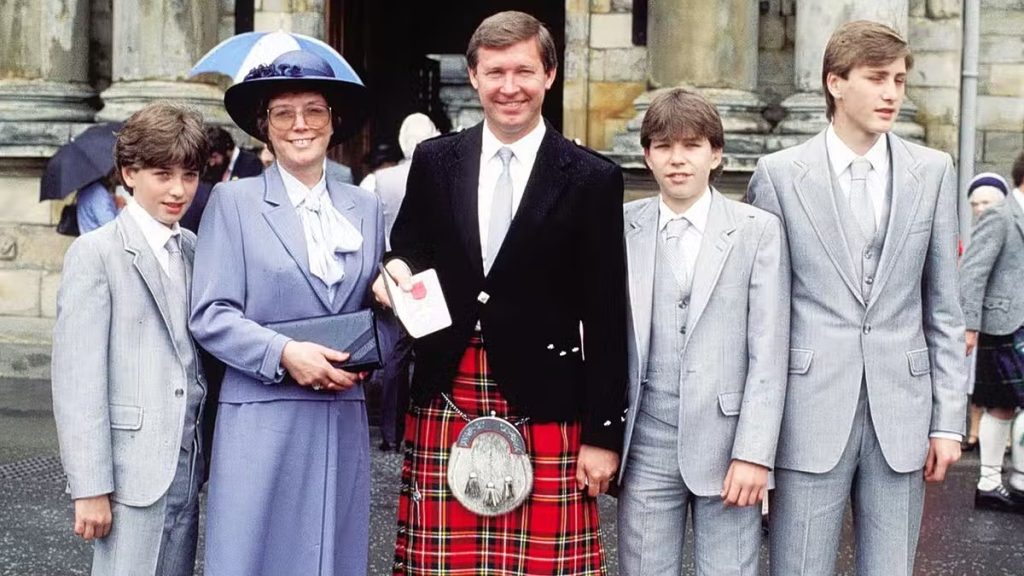
For Sir Alex, his family isn’t just important, they are everything to him. Speaking of his family, let us explore Fergusons in this section of Sir Alex Ferguson Biography.
At an early age, Ferguson resided in the southern part of Manchester. He met his future wife, Cathy, in this city, and the two married in 1966.
Their union began to bear fruit right away. Mark, their first child, was born in 1968. They were married two years before it. They waited for four years before they could have another. Alex Ferguson and his wife welcomed Jason and Darren, a second pair of adorable twins, on February 9th, 1972.
His wife, Cathy, has characterized Alex Ferguson as a kind spouse. From the beginning, he had adored her. Ferguson is a person who doesn’t consider the domestic duties of women. He occasionally helped out around the house, even in the kitchen.
One of the UK’s most successful marriages, according to observers, is theirs. One that deserves imitation that many people have seen. They have been happily married for more than 51 years.
Mark Ferguson, the oldest son of Alex Ferguson, played professionally and served as manager of Peterborough United.
From 1990 through 1994, a twin called Daren played for his father’s Manchester United team. Another twin, Jason Ferguson, is the owner of a football organization called “Elite Sport,” which formerly collaborated with Manchester United while his father was the club’s manager. He also owns an organization that manages events.
Life outside football
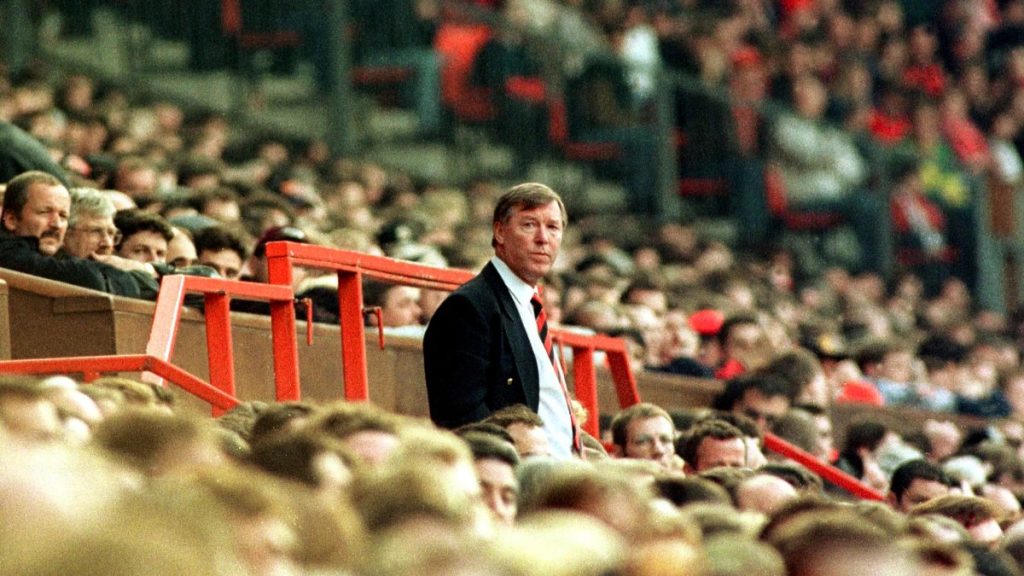
Outside of sports, Ferguson’s life is quite busy. He describes himself as a socialist. A supporter of Manchester United and Labour MP for Manchester, Graham Stringer proposed the creation of a life peerage for Ferguson in January 2011. After Ferguson’s announcement of his retirement in May 2013, Stringer and colleague Manchester Labour MP Paul Goggins reiterated this appeal.
Ferguson was awarded an honorary doctorate from Manchester Metropolitan University in business administration in 2009.
In addition to his ambassadorial duties at Manchester United, numerous public speaking engagements, and charitable commitments in his later years, he has been a longtime supporter of his boyhood team Harmony Row and led a successful effort to raise money for the organization to build new facilities (they are now based at Braehead).
Ferguson favored Scotland staying a part of the United Kingdom in the 2014 Scottish independence referendum. He criticized the Scottish Government for not allowing Scots who reside outside of Scotland in the UK to vote. He also disagreed with the Yes Scotland campaign’s self-imposed prohibition on taking contributions of more than £500 from those living outside of Scotland, which they pushed the No campaign to follow as well.
On May 5th, 2018, Ferguson needed an urgent procedure following a cerebral hemorrhage. He recovered from the procedure, and on September 22nd, 2018, he went to his first game at Old Trafford since.
Ferguson started collecting wine in 1991 after visiting Montpellier, France, and being shown a collection of bottles from Château d’Yquem and Château Pétrus. He offered a portion of his sizable collection up for sale with Christie’s in 2014, with their director of wine David Elswood praising his “exceptional” and estimating it to be worth up to £3 million. Ferguson made £2.2 million in the first three auctions, selling 229 pieces.
Sir Alex Ferguson honors and achievements
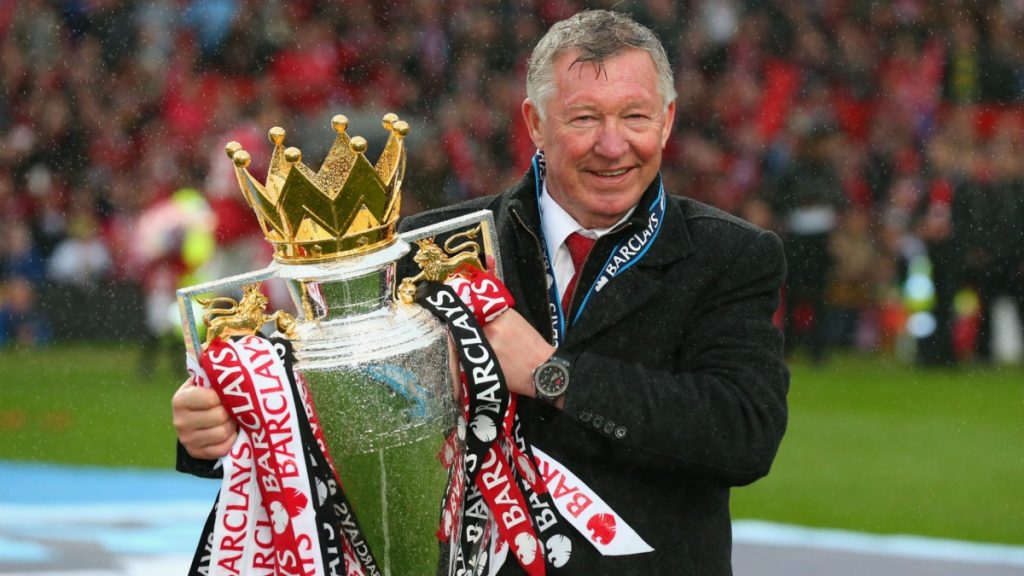
Let’s finish up Sir Alex Fergusons biography with his achievements and honors.
So, recall how we claimed that his managing success made his playing career appear to be a failure? You will soon discover how many trophies this manager has managed to collect throughout the course of his management career.
Ferguson achieved two Scottish Division Two victories as a player, one with Saint Johnstone and one with Falkirk.
Sir Alex Ferguson won the Scottish Cup four times with Aberdeen as a manager and three Scottish Premier Division championships.
He also won the 1999 Intercontinental Cup, the 2008 FIFA Club World Cup, the FA Cup on five occasions, four Football League Cups, the FA Community Shield 10 times, and the UEFA Champions League twice.
He won the Premier League Manager of the Season award eleven times, the UEFA Manager of the Year award once, the IFFHS World’s Best Club Coach twice, the IFFHS World’s Best Coach of the 21st Century once, and the English Football Hall of Fame in 2002 (Manager), among other important individual accomplishments. Can you now see why this man is regarded as one of the top coaches in the entire world—a miracle that will never be attained again?
Comments
Post a Comment